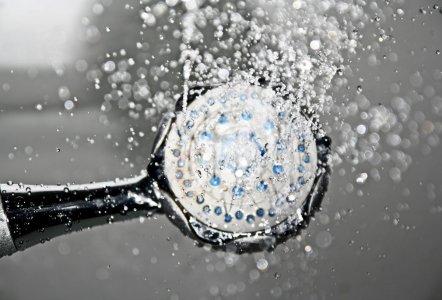Stop peeing in the shower! Doctor reveals shocking reasons why
By
Aubrey Razon
- Replies 0
Disclaimer: The information provided in this article is for educational purposes only and is not intended as a substitute for professional medical advice, diagnosis, or treatment. Always consult your physician or other qualified healthcare providers with any questions you may have regarding a medical condition or before making any changes to your health regimen.
When it comes to bathroom habits, there's a certain topic that's been making waves on social media, and it's time we at The GrayVine dive into the discussion.
You might have heard some chatter about the environmental benefits of peeing in the shower—but before you consider joining the trend—let's unpack some expert advice that might just change your mind.
Dr. Emma Qureshey, a Houston-based OB-GYN, recently took to social media to share her professional insights on why peeing in the shower is a practice best avoided.
While some tout the water-saving perks, Dr. Qureshey warns that the cons far outweigh the pros, especially when it comes to your gynecological and overall pelvic health.
First and foremost, Dr. Qureshey points out that peeing in the shower isn't the most hygienic option. But beyond cleanliness, there's a more pressing concern: the potential damage to your pelvic floor.
The pelvic floor muscles are crucial for supporting the bladder, bowel, and, in women, the uterus. When these muscles are weakened, it can lead to a host of issues, including incontinence.
The act of peeing while standing up, which is often the case in the shower, doesn't allow the pelvic floor to relax properly.
This means your bladder may not empty completely, leaving you at risk for urinary tract infections and other complications.
Another surprising downside Dr. Qureshey highlights is the mental association that can develop between the sound of running water and the need to urinate. This Pavlovian response could lead to “leak issues” when you're exposed to similar sounds outside the shower, making it an inconvenient and potentially embarrassing problem.
“If you pee in the shower, or turn on the faucet, or turn on the shower and then sit on the toilet to pee while the shower is running, you’re creating an association in the brain between the sound of running water and having to pee,” she explained.
Physical therapist Sabrina Baxter echoes this sentiment, emphasizing the importance of listening to your body's natural signals.
She advises against preemptive bathroom trips, such as peeing “just in case” before leaving the house. “It’s not filling to full capacity. You’re peeing when it’s halfway full. So you may have the urge to pee more frequently because it’s only filling halfway… You’re essentially sensitizing your body to work at lower volumes than needed,” Dr. Baxter explained.
In her video, Dr. Qureshey also addresses the topic of home remedies for vaginal infections, such as the use of garlic cloves or yogurt.
She strongly advises against these DIY treatments, as they are unlikely to resolve the underlying issue and may even exacerbate the problem.
Her message is clear: before attempting any home remedies or suppositories, it's crucial to consult with a healthcare professional. Doctors have seen, smelled, and heard it all, so there's no need for embarrassment or fear when seeking medical advice.
While saving water is a noble goal, it's essential to weigh the potential health risks against the environmental benefits. Peeing in the shower might seem harmless, but as Dr. Qureshey and other experts have outlined, it can have unintended consequences for your pelvic health and hygiene.
So, what should you do instead? Stick to the toilet for your bathroom needs, and if you're looking to save water, there are plenty of other eco-friendly practices you can adopt that won't compromise your health.
Let's continue to make informed choices about our health and habits, and when in doubt, always turn to trusted medical professionals for guidance.

Have you ever considered the health implications of peeing in the shower? Do you have any water-saving tips that are both practical and health-conscious? Share your insights in the comments below.
When it comes to bathroom habits, there's a certain topic that's been making waves on social media, and it's time we at The GrayVine dive into the discussion.
You might have heard some chatter about the environmental benefits of peeing in the shower—but before you consider joining the trend—let's unpack some expert advice that might just change your mind.
Dr. Emma Qureshey, a Houston-based OB-GYN, recently took to social media to share her professional insights on why peeing in the shower is a practice best avoided.
While some tout the water-saving perks, Dr. Qureshey warns that the cons far outweigh the pros, especially when it comes to your gynecological and overall pelvic health.
First and foremost, Dr. Qureshey points out that peeing in the shower isn't the most hygienic option. But beyond cleanliness, there's a more pressing concern: the potential damage to your pelvic floor.
The pelvic floor muscles are crucial for supporting the bladder, bowel, and, in women, the uterus. When these muscles are weakened, it can lead to a host of issues, including incontinence.
The act of peeing while standing up, which is often the case in the shower, doesn't allow the pelvic floor to relax properly.
This means your bladder may not empty completely, leaving you at risk for urinary tract infections and other complications.
Another surprising downside Dr. Qureshey highlights is the mental association that can develop between the sound of running water and the need to urinate. This Pavlovian response could lead to “leak issues” when you're exposed to similar sounds outside the shower, making it an inconvenient and potentially embarrassing problem.
“If you pee in the shower, or turn on the faucet, or turn on the shower and then sit on the toilet to pee while the shower is running, you’re creating an association in the brain between the sound of running water and having to pee,” she explained.
Physical therapist Sabrina Baxter echoes this sentiment, emphasizing the importance of listening to your body's natural signals.
She advises against preemptive bathroom trips, such as peeing “just in case” before leaving the house. “It’s not filling to full capacity. You’re peeing when it’s halfway full. So you may have the urge to pee more frequently because it’s only filling halfway… You’re essentially sensitizing your body to work at lower volumes than needed,” Dr. Baxter explained.
In her video, Dr. Qureshey also addresses the topic of home remedies for vaginal infections, such as the use of garlic cloves or yogurt.
She strongly advises against these DIY treatments, as they are unlikely to resolve the underlying issue and may even exacerbate the problem.
Her message is clear: before attempting any home remedies or suppositories, it's crucial to consult with a healthcare professional. Doctors have seen, smelled, and heard it all, so there's no need for embarrassment or fear when seeking medical advice.
While saving water is a noble goal, it's essential to weigh the potential health risks against the environmental benefits. Peeing in the shower might seem harmless, but as Dr. Qureshey and other experts have outlined, it can have unintended consequences for your pelvic health and hygiene.
So, what should you do instead? Stick to the toilet for your bathroom needs, and if you're looking to save water, there are plenty of other eco-friendly practices you can adopt that won't compromise your health.
Let's continue to make informed choices about our health and habits, and when in doubt, always turn to trusted medical professionals for guidance.
Key Takeaways
- A Houston-based OB-GYN, Emma Qureshey, advises against peeing in the shower or standing up due to potential negative impacts on the pelvic floor and creating unwanted mental associations.
- She highlights that peeing in response to running water can lead to “leak issues” and an inability to fully empty the bladder.
- Physical therapist Sabrina Baxter suggests not going to the toilet “just in case,” as it can cause your bladder to be sensitised to operating at lower volumes, leading to more frequent urges.
- Qureshey warns against using home remedies like garlic and yogurt for vaginal infections and stresses the importance of discussing any symptoms or concerns with a doctor.







